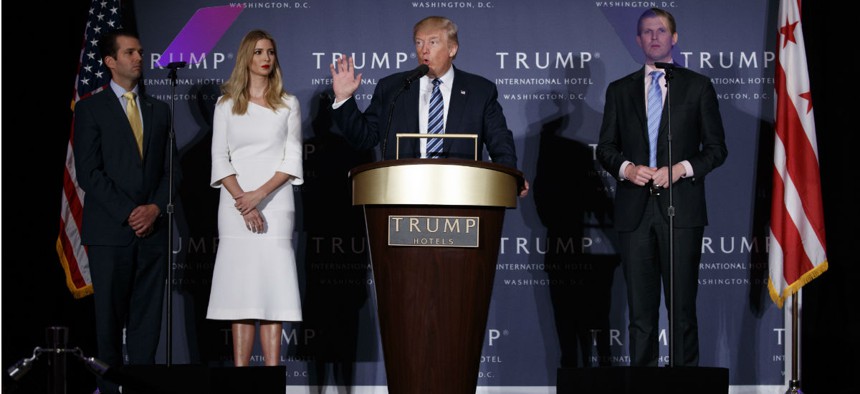Government Ethics Office Now Says Trump’s Business Plans Fall Short
OGE backtracks on previous praise of the president-elect's plans.
President-elect Donald Trump will not eliminate conflicts of interest concerns by transferring power of his company to his children, according to the federal agency with oversight of executive branch ethics.
The Office of Government Ethics said in a letter to Democrats on the Senate Homeland Security and Governmental Affairs Committee that “transferring operational control of a company to one’s children” would not constitute a blind trust, nor would it satisfy federal ethics laws. While statute exempts the president from those requirements, OGE Director Walter Shaub reiterated in the letter his agency’s position the president should conduct himself “as if he were bound by the financial conflict of interest laws.”
Trump said on Twitter on Monday he would pass operational control of his businesses to his two oldest sons, Don Jr. and Eric. He was scheduled to describe the arrangements during a press conference on Thursday, but has since postponed that event. Trump will reportedly retain control of his stake in the company.
Shaub said Trump is required to publicly publish, either on OGE’s or the White House’s website, an annual financial disclosure report by May 15, 2018. Traditionally, Shaub added, presidents post the information in their first year in office. The disclosure will require Trump to post virtually all sources of income and assets. If those reports demonstrate any conflicts of interest, current law will prevent OGE from taking any punitive action.
“Although every president in modern times has adopted OGE's recommended approach, OGE has no power to require adherence to this tradition,” Shaub said.
He did note, however, some laws, especially the Stop Trading on Congressional Knowledge Act, impose ethics-related restrictions on the president. The president cannot use nonpublic information for private profit, engage in insider trading or influence employment decisions at a private entity for a partisan purpose, among other prohibitions. OGE’s regulations on gifts to federal employees apply to the president, Shaub said.
Asked whether conflict of interest laws would apply to Trump’s children and his son-in-law Jared Kushner, OGE said they have not been appointed to federal positions and therefore the agency has no authority over them. While they are members of Trump’s transition team, Shaub said OGE has no authority over that entity.
OGE has provided general assistance to the transition team to help bring the president-elect and his staffers in line with applicable laws, Shaub said, and will continue to do so when he takes office. The agency has for 18 months worked to ensure ethics issues “demand greater focus during a presidential transition,” he said. Earlier this year, it held a three-day training session with more than 500 participants.
Shaub said while OGE has offered to work with Trump specifically on his plans to avoid conflicts of interest, the agency has had no involvement in those details.
The senators expressed concern that federal employees would fear reprisal in dealing with the Trump Organization, to which Shaub said OGE believes in “protecting whistleblowers” and will work with the Office of Special Counsel and Merit Systems Protection Board to do so.
Sen. Tom Carper, D-Del., the governmental affairs committee’s ranking member and author of the original letter to OGE, said Trump should follow the agency’s advice to bring himself in compliance with the conflicts of interest laws applicable to all other federal employees.
“Clearly, transferring control of the Trump Organization to his sons . . . does not solve the numerous conflicts facing the President-elect and his incoming administration,” Carper said. “President-elect Trump has a sworn duty to ensure the American people that, in every decision he makes as president of the United States, he has no other interests than those of our country, and I urge him to heed OGE’s advice in order to do so.”
Carper followed up his letter to OGE with another to Trump himself -- cosigned by 22 other Democratic senators -- imploring him to completely divest himself from his business and create a blind trust to handle his assets.
OGE previously came under fire for a series of tweets in which it seemed to praise Trump for promising to divest from his company, though he has never made any such assurance. The agency said Trump’s “divestiture” was “brilliant” and a “good call.” Divestiture, OGE said, would bring him in compliance with its 1983 guidance that presidents should hold themselves in line with conflict of interest laws that apply to all other federal employees besides the president and vice president.
“Divestiture resolves conflicts of interest in a way that transferring control does not,” an OGE spokesman later said about those tweets. “We don’t know the details of their plan, but we are willing and eager to help them with it.”




